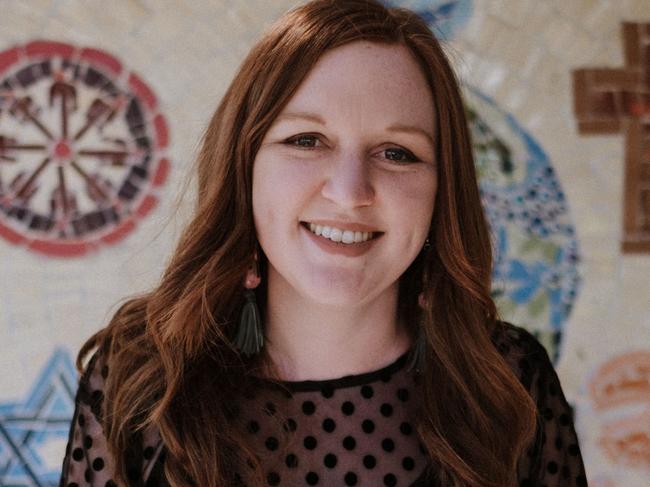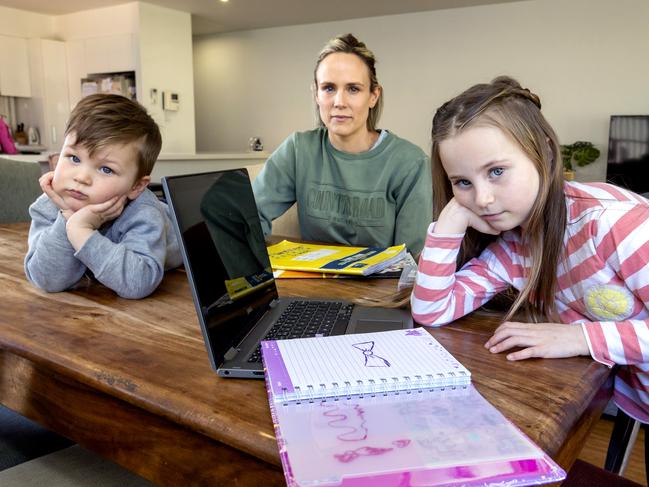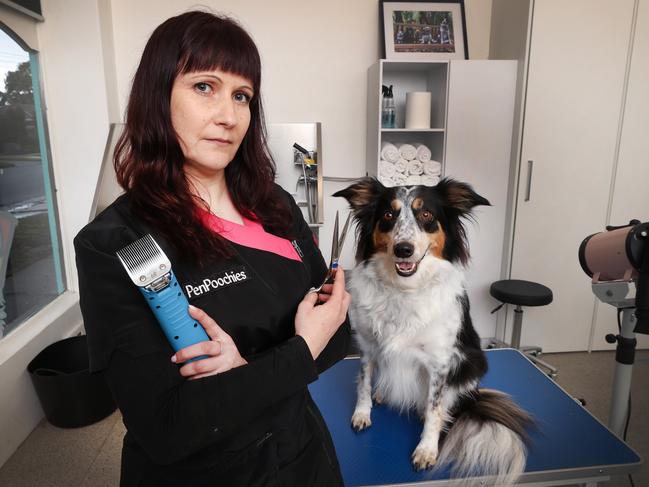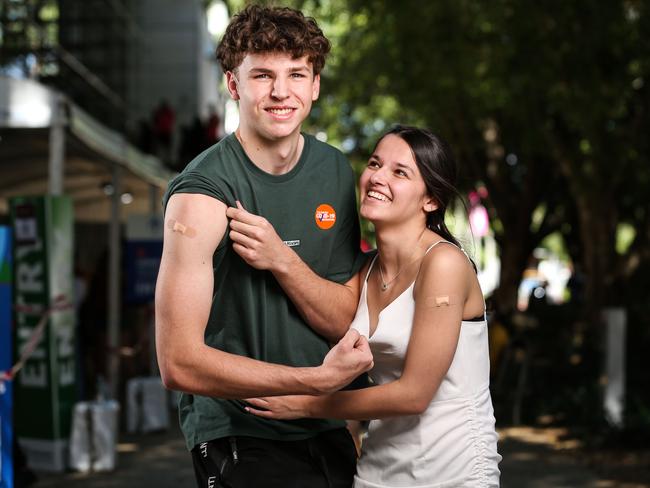New poll reveals what’s scaring Australians more than the Covid-19 pandemic
Australians are anxious and worried as our borders remain shut and some states remain in lockdown. This is what they worry about more than catching the virus.
Coronavirus
Don't miss out on the headlines from Coronavirus. Followed categories will be added to My News.
Lockdown-weary Australians are worried more about the pandemic’s toll on jobs and mental health than any surge in the Covid-19 virus.
More than half the parents of school children fear classroom closures will harm their kids’ education in the long-term – including two-thirds in Victoria, where Melbourne students have spent nearly eight months in home schooling since the start of the pandemic.
Deep distress over the impact of lockdowns is identified in an exclusive new nationwide survey of 3114 Australians, with 44 per cent revealing their own emotional wellbeing, or that of their families, has suffered in the past three months.
In Victoria – marking its 212th day of stay-at-home orders – and NSW, where Sydney residents are entering their tenth week of a three-month lockdown – more than half the residents feel their emotional wellbeing has worsened.
Most Australians worry less about catching Covid-19 than losing their jobs, with business closures and work losses topping the list of concerns as the financial cost of lockdowns hits home.

Mental health is the second-biggest concern, with half the people surveyed – including 63 per cent in Victoria and 58 per cent in NSW – knowing someone whose mental health has suffered during the pandemic.
With only one in three Australians fully vaccinated against Covid-19, 51 per cent are worried about “lots more Covid-19 and deaths in the community’’ and 46 per cent fear catching the virus.
Lack of contact with friends and family is of concern for half of Australians, while 42 per cent fear a loss of personal freedom and 29 per cent worry about losing a “sense of community’’.
Stay-at-home orders and restrictions are hitting the hip-pocket, with nearly four in 10 Australians financially worse off over the past three months and 38 per cent worried about loss of income.

The YouGov poll, conducted exclusively for News Corp Australia between August 20 to 25, will add to the political pressures to better balance Covid-19 control strategies against the need for economic prosperity, educational outcomes and mental health.
The poll shows one in three Australians is fully vaccinated while nearly one in four has had the first jab.
Nearly one third have not been vaccinated yet but want to be, and 14 per cent do not want to be immunized against Covid-19.
Vaccine refusal is highest in South Australia, where one in five residents does not want the jab, with a high rate of 17 per cent in Queensland.

Only 7 per cent of Tasmanians are vaccine hesitant, compared to 13 per cent in Victoria and 14 per cent in NSW and Western Australia.
Council of Small Business Organisations of Australia (COSBOA) chief executive Alexi Boyd said lockdowns and trading restrictions were “horrendous’’ for her 850,000 members.
“In a way, health is running the economy,’’ Ms Boyd said.
“There’s a compounding effect of growing debt, trying to hold on to staff, and growing stress.
“Everybody’s in a holding pattern – the fear is that if this keeps going the businesses that have forcibly closed might not survive.
“It’s disastrous in terms of small business (owners’) mental health.’’
Young Australians and poor households are suffering the most – with 18 to 35-year-olds more likely to report emotional wellbeing getting worse, and those earning less than $50,000 a year suffering the highest rate of financial loss.
Wealthier Australians earning more than $100,000 a year are twice as likely to report being better off financially over the past three months, with one in five pocketing more money compared to one in 12 people on low to average incomes.
Retirees are the most resilient, with the “silent generation’’ of over-75s half as likely as younger Australians to feel “a lot worse off” emotionally.
Australian Council of Social Service (ACOSS) acting chief executive Edwina MacDonald warned that Covid-19 is “shining a light on stark inequalities across our communities’’.
“People on low incomes and in insecure work and housing, including many young people, are suffering the financial and mental toll of lockdowns, which are necessary for public health reasons,’’ Ms MacDonald said.
“People on low incomes and experiencing disadvantage are also at greatest risk of exposure to the virus and to missing out in the vaccine roll-out’’.
Physical health is also being impacted, with 38 per cent of Australians postpone or cancelling health checks, such as mammograms, at the risk of more serious illness and disease in the future.
Mental health problems are afflicting young Australians the most, as lockdowns kill off casual jobs and send house prices soaring just as younger generations are trying to build careers, buy homes and start families.
Two-thirds of Gen-Zs aged under 25, and 58 per cent of Millennials aged 25-40, personally know someone whose mental health has suffered due to lockdowns.
For Baby Boomers, who can cash in on rising real estate values as they enter retirement, the figure is 36 per cent.
Nearly 60 per cent of Australians want schools to reopen, even during Covid-19 outbreaks, once everyone has had the opportunity to be fully vaccinated.
Murdoch Children’s Research Institute research fellow and clinical psychologist Dr Ali Fogarty said children are suffering physical and mental health problems due to lockdowns, with one in five Victorian teenagers contemplating suicide at some point during the pandemic.
“Young people have had it really tough over the last 18 months, missing out on key activities that bring a lot of social connection,’’ she said.
“School brings a lot of structure and regular exercise, meal times and sleep times, and lockdowns can throw that all out the window.
“Young people are using screens more, and lack of physical activity can have a big impact on mental health, and be a risk factor for depression.
“The rate of suicidal ideation is significantly higher (than before the pandemic) … we need to prioritise mental health alongside physical health.’’

The YouGov poll shows that women worry more about the economic and social side-effects of the Covid-19 pandemic, with 61 per cent rating business closures, job losses and mental health impacts as their biggest concerns.
Among men, 55 per cent are concerned about businesses and jobs, and 51 per cent about mental health.
Mothers worry more about their kids’ education, with 61 per cent declaring lockdowns will have a negative long-term effect, compared to 43 per cent of fathers.
Women are also more likely to postpone health checks, and to report lower emotional wellbeing and a worsened financial situation.
Dr Fiona Martin, a psychologist and Liberal MP who chairs the federal parliamentary committee on mental health and suicide prevention, said that “anxiety is growing like a virus in a petrie dish’’.
“Parents are anxious and stressed right now because they’re trying to keep their families safe, get vaccinated, manage a business or job while also supervising and educating their children, and running a home,’’ she said.
“I think it’s particularly tough on women because they tend to take on the mental load.
“The stress placed on parents at times will trickle down to children … I’m most concerned about children living in apartments … or vulnerable children who live in families where it’s not safe.’’
Only one in six Australians wants lockdowns to continue until Covid-19 is eliminated.
Half think lockdowns should lift once 80 per cent of the eligible population is vaccinated, and nearly a quarter want freedom once everyone who wants to be vaccinated has a chance to get the jab.
One in eight Australians – including one in seven in NSW and Victoria – want lockdowns lifted immediately.





